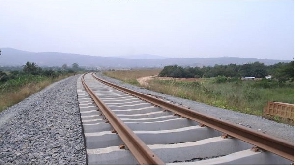One of Ghana’s major problems is the lack of a robust railway system across all 16 regions. As a country that gained its independence 67 years ago, we cannot even boast of a working, dependable, effective railway system that services citizens to all parts of the country without stress.
Our over-reliance on the vehicular transport system has contributed largely to the increasingly worse traffic situation we experience in the country.
One would argue that having a robust railway system will not guarantee the reduction or improvement of our terrible traffic situation. Yes, that’s a point well made. However, having a working railway system will give commuters and travellers available options for them to choose from.
Research conducted by ScienceDirect.com back in 2020 showed an alarming decline in the effectiveness of available rail lines (16.9% in 2020) and accessibility to railway services (0.6% in 2020).
Currently, Ghana can only boast of a few operating railway lines as most of the lines are either not functioning or have been neglected and left to the fate of scrap dealers.
Traffic congestion
Research suggests that countries that have railway systems mostly have on average 7% less congestion from traffic, 1 % less travel time and 3% less pollution than cities with no railway systems.
Imagine a robust working railway system connecting major cities across the country. That alone can largely, to an extent, deal with traffic congestion nationwide.
With a variety of options available (trains, vehicles), the pressure and high demand for commercial transport will ease up. Roads will be largely clear of vehicles, making things smooth and even reduce the travel time across places.
Commuters who travel from Kasoa to work in Accra won’t have to stress over spending long hours in traffic before and after work.
Unemployment
Individuals can easily take a job offer in Accra if they live in Kumasi, should there be a railway line that connects Accra to Kumasi and other parts of the country. Also, to some extent, it will deal with the transportation crisis.
A check on the Ghana Railway Company Limited’s official website shows that a train commuting from Accra to Tema charges between GH¢5 to GH¢7. Meanwhile, picking a commercial transport for the same journey will cost twice or even triple the amount.
Surge in rent
Additionally, the current surge in rent prices in Accra will ease up. If someone living in Obuasi secures a job in Accra, they won't have a need to relocate just to be closer to work if there’s a railway line that connects Obuasi and its surrounding towns to Accra.
An individual can close from work at 5pm in Accra and still manage to travel by train back to their homes without stress.
African countries are evolving. Good policies are being implemented, roads are being constructed, and railway lines are being built (in the case of Nigeria) amongst many other implementations.
Ghana, on the other hand, has taken a back seat and has taken its foot off the ‘progressive’ gas pedal.
Our roads are in bad shape, dilapidated, an eyesore, full of potholes and continuously causing damage to vehicles.
Governments
Governments, both past and successive ones, have failed to leave a legacy of revamping and reviving the country’s railway system. Promises are easily made but its implementation seems to become a problem of the day. A check on the Ministry of Railways Development's official website showed no evidence of ongoing or completed projects as at the morning of Thursday, July 4, 2024.
However, a tall list of priority projects by the ministry have been made available on the site.
In conclusion, the significant benefits of having a robust railway system will be immeasurable for Ghana than we can anticipate.
MAG/ ADG
General News of Thursday, 4 July 2024
Source: www.ghanaweb.com

















